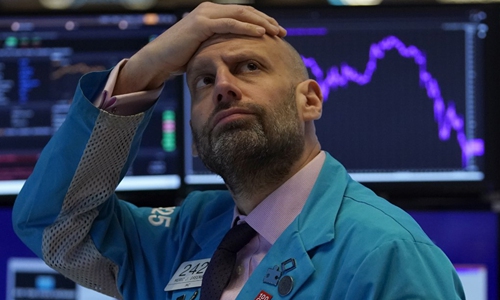
Meric Greenbaum, Designated Market Maker IMC financial looks up at the board before the opening bell right before trading halted on the New York Stock Exchange on March 9, 2020 in New York. Photo: AFP
China's shares are still one of the "best performers" among global stock markets, which mostly tumbled in a coronavirus-triggered market selloff, although mainland markets are also under pressure amid rising global risk aversion, Chinese analysts said on Tuesday.
Their comments are a rebuke against some US media badmouthing of Chinese A-share stock markets, including describing Chinese stocks as "increasingly vulnerable" and subject to "bearish momentum."
"I think the US should mind its own business when its stock markets show problems of rising bubbles and flash crashes in a much worse way than Chinese shares," said Bai Ming, an economist at the Ministry of Commerce's International Market Research Institute.
According to Bai, possibilities exist that the US might slip into an economic contraction if the coronavirus isn't contained properly.
Stock markets in the Chinese mainland had a mixed but overall stable performance on Tuesday. The CSI 300 index, which consists of the 300 largest and most liquid A-share stocks, edged down by 0.49 percent. The benchmark Shanghai index was down 0.34 percent, but the Nasdaq-like ChiNext index rose by 0.36 percent.
In comparison, the US market was crashed again on Monday after the US Federal Reserve's emergency interest rate cut spooked investors. The Dow Jones shed nearly 3,000 points, marking the largest one-day point decline in US history, and the S&P 500 dived to trigger the circuit breaker for a third time this month.
So far this year, the falling range of the Dow Jones, at about 30 percent, has tripled that on the Shanghai market. The S&P 500 has also dived by more than 25 percent.
In a research note sent to the Global Times, MSCI said the market turmoil sparked by the coronavirus pandemic is "reminiscent of market conditions after the terror attacks in 2001 and the onset of the global financial crisis in 2008."
The US has entered crisis mode amid fears sparked by the fast-spreading coronavirus and the Fed's excessively drastic easing, but the crisis it is experiencing is different from the 2008 financial crisis, Wu Jinduo, head of fixed income at the research institute of Great Wall Securities, told the Global Times on Tuesday.
"In technical terms, US stocks have entered a bear market," Wu said.
According to Wu, US companies, especially shale gas firms, are at risk of corporate bond defaults as oil prices plunge. Additionally, the services part of the US economy including aviation, catering and tourism is grappling with the coronavirus shock.
In comparison, Chinese financial markets have been much more "robust" and stable, which experts attributed not only to China's effective combat against the coronavirus but to the country's economic resilience.
Zhang Lei, general manager of the Beijing Jingu Industrial Fund Management Co, said that there are signs, such as the stable raw material prices, which showed that China's market demand has just been suppressed, but not wiped out, by the epidemic.
"There's a mood of wait-and-see on China's financial markets but I see no extreme pessimism. In overseas markets, however, the stock plunge is more about worries for long-term growth instead of about what the economy has suffered under the coronavirus," Zhang told the Global Times.
But Wu also cautioned that the A-share markets might have increasing volatility under global influence.
Global asset prices have seen high volatility since March 9 and there have also been big swings in safe-haven assets such as gold.
According to Wu, overseas capital is estimated to keep flowing into and out of the mainland market as the global equity market is in "fragile" mode. About 7 billion yuan ($997 million) of capital flowed out of mainland stocks on Tuesday.
"Chinese mainland shares are now among the world's best-performers, but not necessarily the safest," Wu stressed, saying central banks in developed nations have run out of conventional monetary tools and become mired in liquidity traps amid the "cash-is-king" sentiment.




